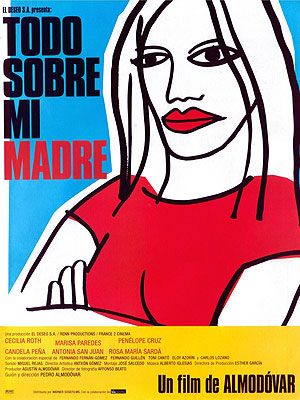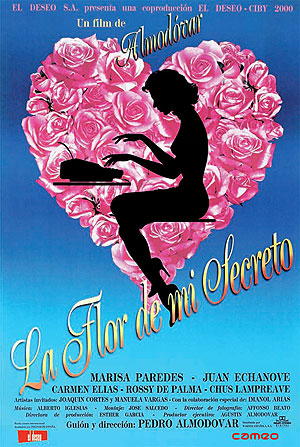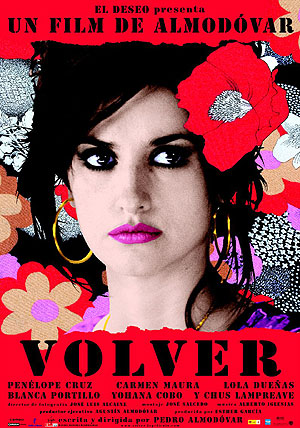
Pedro Almodóvar
My introduction to Almodóvar’s work happened when I was at a crossroads in life. Having had just left my teens, I’d also just left my old life behind in India to move to the US for graduate school. I was meeting people and having experiences very new to me. Watching Talk To Her (2002) at a university movie club was one such experience which was exciting and distracting enough to ensure I kept coming back. Now many years later, I’m able to look back and appreciate the Almodóvar-esqe arc of my love with films.
 Pedro Almodóvar
Pedro AlmodóvarSome of the most striking features of his films to me were the feminine sensibility in hyperbolic situations and the recurrence of characters you’d be hard pressed to find in other films. From female matadors to transvestite prostitutes, to pregnant nuns and comatose patients, the stark uniqueness of these characters was the initial draw that kept me hooked. As I watched more of his work though, I learnt to appreciate how he made a career of showing the underlying humanity of people who at first might seem hard to relate to and, in so doing, forces us to consider our place in the worlds we inhabit.
While watching Almodóvar’s films, it’s hard not to notice just how many characters seem to be engaged in the act of consuming art too, be it films, plays, concerts, recitals, television shows or bull fights. It’s as though he’s holding a mirror up to our voyeuristic selves but also validating the value of art in our lives by choosing to make films about actresses, directors, novelists, bull fighters, dancers and journalists. The opening scene in Talk To Her is one of many such instances. We meet Benigno (Javier Camara) and Marco (Dario Grandinetti), strangers seated next to each other during a Pina Bausch recital. Benigno is a nurse devoted to caring for Alicia (Leonor Watling), a dancer he has long loved but who is now comatose.
 Talk To Her, dir Pedro Almodóvar, 2002
Talk To Her, dir Pedro Almodóvar, 2002Marco is a journalist who becomes interested in doing a piece on Lydia Gonzalez (Rosario Flores), a famous bull fighter, after seeing her on a television talk show. Marco and Lydia become lovers but soon after, Lydia is gored by a bull in a fight and goes into a coma. Thus, the two men’s lives intertwine as Marco, who has loved and lost in the past, becomes lonely again and the habitually lonely Benigno delights in having found someone to talk to in his comatose love.
We watch curiously as the usually emotional Marco struggles to strike a chord with an uncharacteristically dormant Lydia, ever the son her father never had. Meanwhile, the tender, one-sided love affair between effeminate Benigno, always the butt of jokes, and a sleeping Alicia takes a malicious turn. Almodóvar presents this unexpected turn of events to us in a brilliantly unexpected way, by paying homage to classic Hollywood through a silent film piece — narrated by a sexually repressed male nurse who has been accidentally shrunk to pixie-size, it shows him entering the vagina of his sleeping girlfriend. By doing this, not only does Almodóvar creatively inform us of Benigno’s misconduct, he also shields us from it.
While Talk To Her is unique in the sense that the principle female characters in the film are largely passive objects of affection at the hands of their admiring men, All About My Mother (1999) is the quintessential Almodóvar masterpiece. It celebrates women of many kinds – mothers, actresses, nuns, prostitutes, even men who want to be women. Whereas Talk To Her is about the loneliness that comes with being in the company of those you love, All About My Mother is about the loss of a loved one, in this case, a mother’s son. Cecilia Roth gives a career-best performance as Manuela, the grieving mother who comes to rely on an uncanny group of women to help her cope with her grief. As exemplified in All About My Mother, women have always been the focal point of his work. Almodóvar’s cited the influence of early Hollywood dramas revolving around a central female character on his work:
 All About My Mother, dir Pedro Almodóvar, 1999
All About My Mother, dir Pedro Almodóvar, 1999Being more familiar with his later work, I was quite surprised to see how his early work from the 1980s was so different, such as in Matador (1986), Law Of Desire (1987) and Women On The Verge Of A Nervous Breakdown (1988), which all seemed to share an exaggerated aesthetic with a penchant for camp. And yet, all three have a combination of the trademark themes that mark his work – love, obsession, desire, identity and pop culture. Given the post-Franco Spain in which these films were conceived, the fierceness seems to go hand in hand with the prevailing sense of newfound freedom. Marvin D’Lugo, a Ph.D professor of Spanish at Clark University, says:
However, it wasn’t really until I came across The Flower Of My Secret (1995) that I noticed another definitive and more interesting shift in his style. Almodóvar himself describes it as such:
 The Flower Of My Secret, dir Pedro Almodóvar, 1995
The Flower Of My Secret, dir Pedro Almodóvar, 1995In Flower Of My Secret, we meet Leo (Marisa Paredes) who writes popular romance novels under a pseudonym but hates her success and is depressed over her faltering marriage. Her life crisis is worsened by an impossible mother (Chus Lampreave) who drives her and her sister (Rossy De Palma) up the wall so that it is of little surprise whatever she writes comes out, as she puts it, “black” instead of “pink”. Leo has just written a novel, The Cold Storage Room, that has not been well received by her editor Alicia (Gloria Munoz) who is furious about its dark plot which is in violation of the terms of Leo’s contract:
When a grim-faced Leo points out that such is reality, Alicia condemns reality saying there’s reality aplenty in newspapers and television, enough to explode the country. In her defense, Leo responds “Maybe I’m evolving”. It’s for this sense of realization of one’s evolution that I find Flower so interesting. Compared to his other films, the emotional chord in this one is not quite as strong but it does represent the journey Almodóvar seems to have been on towards his later work which I have come to love.
 Volver, dir Pedro Almodóvar, 2006
Volver, dir Pedro Almodóvar, 2006As a frantic Leo is forced to embrace reality by those around her, she hits rock bottom before finally finding her happy ending not unlike those found in her pink novels. There’s a scene where his suicide attempt is foiled by the voice of her neurotic mother from an answering machine which is both hilarious and metaphorical in its motif of using the past as a way to inform the future.
Another trend that becomes apparent the more we watch Almodóvar’s work, and something he’s noted himself, is how some ideas and stories tend to float through his body of work in various shapes and sizes. The plot of Leo’s novel The Cold Storage Room is essentially the setting for Volver (2006). Literally meaning “to return” in Spanish, the film is about Raimunda (Penelope Cruz), a working-class mother living in a small village, who learns that her derelict husband had tried to rape her daughter and then, after he is murdered, disposes of his body in the freezer of a neighbor’s restaurant. Another example is the opening scene in Flower Of My Secret where a character named Manuela shoots a behavioral training video to guide hospital nurses in effectively seeking organ donations from relatives of brain-dead patients. An almost exact replica of this scene can be found in All About My Mother with the principal character of that film, also called Manuela.
- [1]Sigal Ratner-Arias (19 November 2009), Associated Press
- [2] D’Lugo, Marvin. “Almodóvar’s City of Desire.” Quarterly Review of Film and Video Vol. 13, No. 4 ( 1991): p47-65.
- [3] Jose Arroyo (31 July 2002), The Guardian
Perhaps not coincidentally, my two favorite works by Almodóvar are also his most autobiographical and, interestingly, seem to have been designed to be sequential such as in real life. All About My Mother ends with a shot of stage curtains closing; his next film Talk To Her opens with a shot of the same curtains opening. It’s as though he wanted to show us he’d not forgotten his roots after the success of All About My Mother.
Frequently revisiting plots with traditionally infringed-upon characters in environments unconstrained by moral discourse is a pivotal aspect in Almodóvar’s work which he uses not only to allow his characters to live and grow, but also to reinforce his own sense of self. This warm, welcoming space is one of the key reasons I have continued to grow with his films and also been brought to introspect on my own evolution as a person. I look forward to many more curtains closing and opening on his stage.

Richa Rudola
Richa developed an interest in films while attending a weekly movie club as therapy during her pursuit of a graduate degree in Statistics. The interest evolved into a passion for the visual storytelling medium and she’s currently working on her first screenplay. She prefers films that view the world from a sociological lens and tell stories of courage.
Richa tries to use films as a means for becoming a better person and especially appreciates a film that proves her initial gut instinct wrong. Some of her favorites are All About My Mother, Rosemary's Baby, Eternal Sunshine Of The Spotless Mind, Antichrist, In The Mood For Love, Omkara, Andaz Apna Apna and Ponette.
You can follow her on Twitter at @richarudola.
© 2022 STATIC MASS EMPORIUM . All Rights Reserved. Powered by METATEMPUS | creative.timeless.personal. | DISCLAIMER, TERMS & CONDITIONS
HOME | ABOUT | CONTACT | TWITTER | GOOGLE+ | FACEBOOK | TUMBLR | YOUTUBE | RSS FEED
CINEMA REVIEWS | BLU-RAY & DVD | THE EMPORIUM | DOCUMENTARIES | WORLD CINEMA | CULT MOVIES | INDIAN CINEMA | EARLY CINEMA
MOVIE CLASSICS | DECONSTRUCTING CINEMA | SOUNDTRACKS | INTERVIEWS | THE DIRECTOR’S CHAIR | JAPANESE CINEMA





